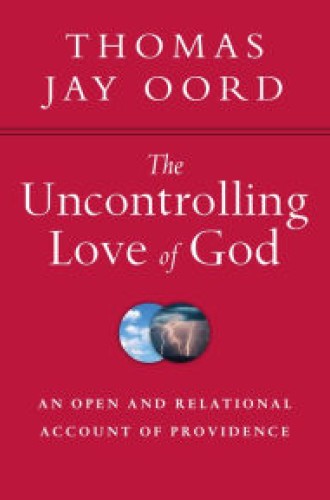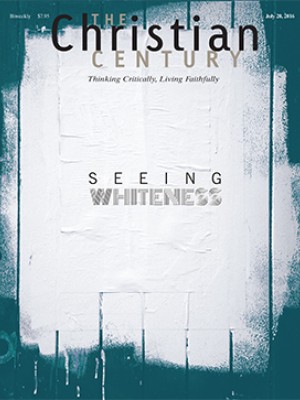Love without coercion
Tragedy needs an explanation. Perhaps one of our deepest human needs is to make meaning out of the painful events we witness and experience. In The Uncontrolling Love of God, Thomas Jay Oord presents a comprehensive answer to questions about God’s providence and its relationship to both “genuine evils” and random events.
He addresses the ancient conundrum: if God is perfectly good, and if God is able to control creatures or circumstances but does not do so to prevent genuine evil and suffering, then God is not perfectly good after all and is morally culpable in the genuine evil that occurs in the world. Oord presents the problem starkly: “A God worthy of our worship cannot be someone who causes, supports, or allows genuine evil. In fact, I believe it is impossible to worship wholeheartedly a God who loves halfheartedly.”
Read our latest issue or browse back issues.
Before presenting his own solution, Oord describes and critiques seven models for understanding providence, giving careful attention to those that seem to be most commonly held among today’s Christians. His critiques are humble and fair; he acknowledges the reasons each model is appealing to some people, while being honest about the problems it creates.
For example, the Calvinist view is that God is the omnicause of everything that occurs in the world, whether good or evil. Oord contends that some people find this view attractive because it allows them to say that even the most heinous event is part of God’s plan. Of course, any pastor who has had to console a family after a senseless, tragic death knows that this blueprint view of providence fails in practice because it makes God the author of unspeakable tragedy that does not make the world a better place.
Oord also challenges the view that God empowers humanity with free will but reserves the right to sometimes override human agency to force his plan to come to pass. Acknowledging that this is the average view among Christians, Oord objects that it posits that God is capable of preventing evil, but generally chooses not to. This makes God morally culpable for the evil God does not prevent.
As for the view that God is voluntarily self-limited—that God made a promise at creation not to interfere with human free will and thus God cannot prevent evil without breaking the promise—Oord contends that it makes keeping a promise more important than loving creation. In this view, God remains culpable because God retains the power to prevent evil but chooses not to do so.
Most of us who have had to face evil and suffering in our own lives or in the lives of those around us know that these models fail—even if we have yet to admit that to ourselves. As Oord correctly points out, when we realize that our models of providence don’t work in real life, we often resort to arguing that it’s all a mystery.
After deconstructing the other views, Oord presents his essential kenosis model of providence, which is based on a framework of open and relational theology, often called open theism. The essential kenosis model bears some similarities to the alternatives, but it avoids making God culpable for evil, whether passively or directly.
Oord contends that love is the primary attribute of God’s essence, and that it is an immutable attribute. Love is self-giving—kenotic—and does not and cannot coerce, or take total control over, free agents. Although God is sovereign, God’s sovereignty flows from God’s immutable loving nature. This means that God is free to choose among possible options of how to love, but cannot take total control over another because this would contradict God’s immutable nature. Just as scripture tells us there are things God cannot do (God cannot lie, God cannot deny God’s self), Oord makes the claim that God cannot coerce and is therefore not culpable for humans’ evil actions.
In Oord’s model, God is limited, but not voluntarily. Instead, God is limited by God’s immutable essence, which is love. God invites and empowers created beings to partner with him to prevent and stop evil, but God cannot totally overpower individuals in order to prevent evil. Doing so would be contradictory to God’s loving essence, which precedes God’s sovereignty.
Oord’s kenosis model is a compelling answer to the problem of evil that draws on scripture, theology, philosophy, and science. At the very least, he has established the foundation of a better theology of providence. However, some readers may find themselves disagreeing early on with Oord’s contention that love is never coercive, depending on the definitions a given reader brings to the text.
Oord does not discuss his use of the term coercion until later in the book, where he clarifies that he is using it in the metaphysical sense of controlling entirely—which, he says, involves “unilateral determination in which the one coerced loses all capacity for causation, self-organization, agency or free will.” Perhaps this discussion would have been helpful earlier in the book because it is fundamental to Oord’s argument. Readers may want to skip ahead and read his definition of coercion so as to fully grasp the kenosis model.
Although it is worthy on its own terms, The Uncontrolling Love of God is perhaps best digested in dialogue with other voices, especially for those who desire to go farther than Oord does. For example, Oord does not deeply consider suffering as a result of evil or offer an in-depth exploration of how God does work to prevent evil. I would place Oord in dialogue with either Gregory Boyd’s God at War: The Bible and Spiritual Conflict or Jessica Kelley’s Lord Willing? Wrestling with God’s Role in My Child’s Death in order to continue Oord’s discussion under the umbrella of open and relational theology.
Oord fills a critical gap in the literature of open and relational theology, and he offers a clear, biblically sound, cruciform answer to the problem of evil and God’s providence, while avoiding the pitfall of divine culpability that previous models of providence fall into.







